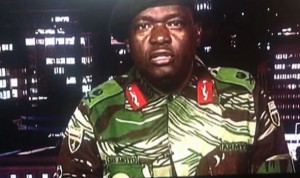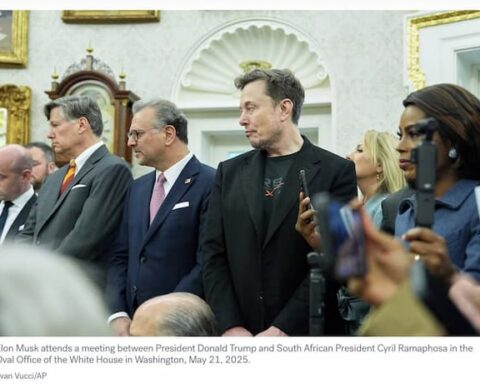It’s difficult to tell – particularly for someone like me, who isn’t particularly well versed in the Zimbabwe situation.
That being said, judging by the reactions of journalists and outlets who are much better versed in Zimbabwe, no one really knows if the military intervention in Zimbabwe should be seen as a good thing or a bad thing.
Even ‘experts’ on the country seem undecided or even ambivalent; some being please Mugabe is finished, others not convinced this apparent change is going to lead to any real improvements.
What is interesting to note, however, is the explanation given for the military’s actions. Zimbabwe’s army chief, General Constantino Chiwenga, has said that Robert Mugabe‘s Zanu PF had been infiltrated by ‘counter-revolutionaries’ and that “drastic action” was needed immediately.
The military seemed keen, at first anyway, to insist this wasn’t a coup at all and wasn’t about Mugabe, but about the ‘criminals’ around him.
On November 13th, General Chiwenga had announced that he and his officers could not allow the “counter-revolutionary infiltrators”, thought to be behind Grace Mugabe, to continue their purges of the party.
What’s clear is that the 93 year-old Mugabe wouldn’t have long left at any rate – and there was a clear understanding that Zimbabwe’s First Lady, Grace Mugabe, would stop at nothing to inherit power upon Robert Mugabe’s demise and seek to create a ruling dynasty.
If the military wanted to curtail Grace Mugabe’s ambitions, it would make sense to do so early, rather than to give her time to consolidate her position and her future claims to power. Mugabe’s circle has been engaged in purges of all possible opposition to the family. This was perceived or portrayed by Chiwenga as an operation by counter-revolutionaries to remove people associated with the “liberation history” from the party and to put undue power into the hands of people with no connection to that history.
Chinegwa also cited the the experiences of countries like Somalia and the Central Africa Republic, which degenerated into severe conflict that destroyed the social and economic security of its citizens, and argued that the Constitution of Zimbabwe mandated the military stepping in to protect the interests of the country.
The line might’ve been crossed recently when Mugabe’s long-time ally Emmerson Mnangagwa was dismissed – he was, supposedly, fired because some of his supporters had booed Grace Mugabe at a rally. That action may have been what finally prompted the military intervention. General Chiwenga is seen as being very close to Mnangagwa.
Mnangagwa is also someone with clear aspirations to be president.
So, assuming that Chiwenga’s military faction wants Mnangagwa to take over, this is simply a clash between rival factions seeking power and trying to stake pre-emptive claims in the full knowledge that Robert Mugabe doesn’t have long left and will leave a power vaccuum when he dies.
In terms of the claim by the General that the military is duty-bound to intervene to preserve the best intersts of the country and the people, one wonders why the military hasn’t intervened against Mugabe after all kinds of crises in the past, rampant corruption, horrendous mismanagement, ethnic cleansing, violence against political opponents, or oppression of the people.
Zimbabwe has been mismanaged and ill-treated for years under Mugabe – there’s no reason to believe that any faction or action here is motivated by noble ideals or necessarily the best interests of the people.
As for Emmerson Mnangagwa, he has obvious credentials from his role in Zimbabwe’s liberation history. However, even if he might be an improvement on Robert Mugabe, he is hardly covered in roses.

Among other things, Mnangagwa has been implicated in genocide in the 1980s.
David B. Moore, a Professor of Development Studies at the University of Johannesburg, wrote a very interesting piece for The Conversation, in which he highlights Mnangagwa’s apparent links with the UK, with the implication that the UK sees Mnangagwa as a viable option to replace Mugabe.
In a country with obvious suspicions – for clear historic reasons – about the British state, Emmerson Mnangagwa’s own claims to power might be seen as suspect.
Still, anything’s probably better than Robert Mugabe.
Mugabe has become the living embodiment of the famous quote from Christopher Nolan’s The Dark Knight – the one about either dying a hero or living long enough to become the villain.
Had Mugabe stepped away decades ago, he might be widely regarded as one of the great leaders of Africa.
Instead, what started as a genuine liberation philosophy and a justified movement against Colonialism and white supremacy quickly became – as often happens – mere cover for Mugabe to acquire wealth and cling to power at the expense of his people and his country. A country he helped liberate – and which he eventually mismanaged into virtual collapse, while murdering and oppressing all opposition, fostering a black supremacy to replace white supremacy and ensuring that no true democracy could arise to undermine his position.
This is something that happens commonly: leaders who have a genuine pedigree from a liberation movement, or whose own mythology is tied up in the national identity (be it an independent movement or a great struggle against foreign, Colonialist or imperialist powers), are able to use that pedigree as a permanent shield against criticism or opposition. In that paradigm, anyone who opposes them or tries to change the paradigm can be portrayed as a traitor to the national struggle or as being an agent of foreign meddlers.
And, in that paradigm, the cult of personality around the leader is tied up in the idea of loyalty to the nation and to the ideal – this essentially makes the figurehead virtually unassailable for a long time. Because, to oppose him and his programme, is to somehow support or justify the evil, foreign power that was in control before.
In truth, there is probably some justification to Mugabe’s longstanding claims that foreign, international sanctions are – at least partly – to blame for Zimbabwe’s woes. But the inescapable truth is that most of it is due to the regime’s own catastrophic mismanagement and misjudgements.
Desmond Tutu called Mugabe a cartoon-like archetype of an African dictator – there was a time when he could’ve been something else, but that time passed long ago (and the window was probably quite short).
It should be borne in mind, however, that even now, Mugabe might still be able to stay ‘in power’.
The military’s insistance that this wasn’t a coup – and the care that was taken to clarify that this wasn’t about Mugabe but about corrupt individuals and criminals around him – could indicate that they might envision a scenario where Mugabe loses all real power, but nevertheless stays on as some kind of figurehead or symbolic leader until he dies.
There are some, even now, saying Mugable will be remembered as one of the greatest African leaders of all time: but he won’t be – it’s far too late for that.
_________________




